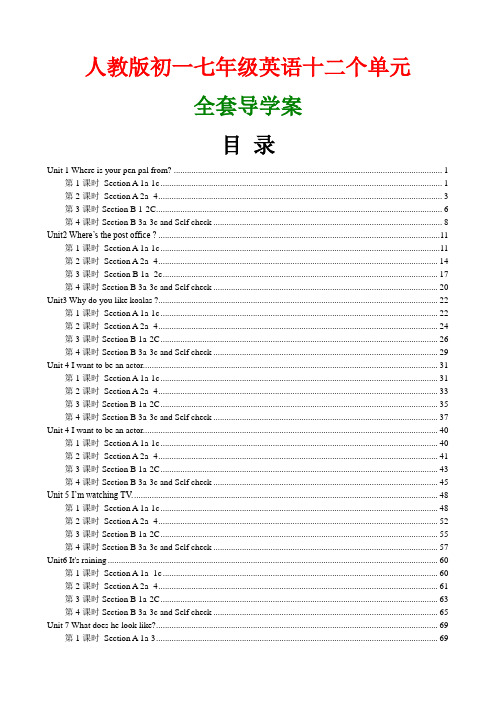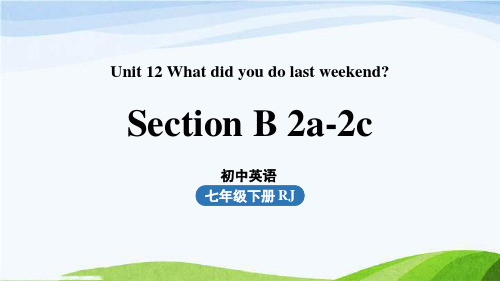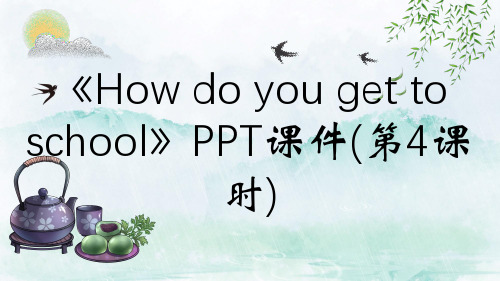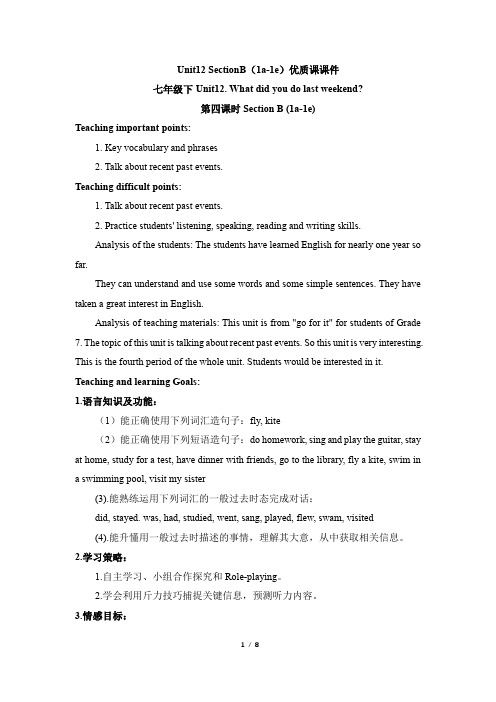人教版英语七年级下册 Unit 12 第4课时
人教版英语七年级下课时练习:第4课时 [Unit 4 Section B2 2a-2c]
![人教版英语七年级下课时练习:第4课时 [Unit 4 Section B2 2a-2c]](https://img.taocdn.com/s3/m/7098d08d312b3169a551a424.png)
第4课时[Unit 4 Section B2 2a2c]Ⅰ.根据句意及首字母提示补全单词1.—How do you f________ now, Betty?—Oh, much better.2.This TV show is t________. I don't want to watch it.3.Your sweater is d________. Go and wash it!4.We are all afraid of Mr. Green because he's very s________ with us.5.I think students must f________ the school rules.6.Don't l________ dirty dishes in the kitchen.7.Boys can't k________ long hair in our school.8.R________ to bring your homework to school tomorrow morning.9.For me, English is as i________ as math. I must learn them well.10.It is my duty to do the d________ after dinner.Ⅱ.用括号中所给单词的适当形式完成句子(每空仅限1个单词)11.He often does some________ before going to bed.(read)12.She practices________ the violin every day.(play)13.Don't make any________ when you are in the reading room.(noise) 14.Listening to soft music makes me________.(relax)15.Don't keep water________ when you brush your teeth.(run)16.The sign on the wall says “No________”. So you'd better not eat.(eat) 17.He is________ ill, lying in bed.(terrible)18.Please give us two________ apples.(many)19.“13” is an________ number for most Westerners.(luck)20.Keep________,please.Father is sleeping.(quiet)()21.—Can we talk loudly in the library?—No, we can't. We have to________.A.be relaxed B.keep quietC.be afraid D.be noisy()22.After dinner, Bob can't take a walk, ________.A.also B.too C.either D.so()23.There are________students in the hallways.A.too much B.too manyC.much too D.many too()24.Remember________ me when you arrive in Beijing.A.calling B.to callC.call D.called()25.On weekends Mary usually________ books at home. Sometimes she goes to ________ her friends.A.reads; look B.looks; seeC.reads; see D.watches; see()26.—________ I swim here?—I'm sorry. Children________ swim alone here.A.Must; can't B.May; mustC.Can; mustn't D.Can't; can()27.—I'm sorry to keep you________ for long.—That's OK.A.to wait B.waits C.waiting D.wait()28.You can't eat in the classroom________ hallways,________ you can eat in the dining hall.A.and; but B.or; butC.or; and D.but; and()29.—Dad, why should I stop playing computer games?—For your health, I'm afraid you ________.A.mustn't B.have to C.can D.needn't()30.Bob often helps me________ the dishes, and I help him________ his English.A.to do; with B.doing; withC.with; to do D.do; to doⅣ.完形填空James is a middle school student. He isn't happy today, because it's really a(n)__31__ day for him.In the morning, his clock doesn't work,__32__ he gets up late. James runs quickly to school, but he is still(仍然)__33__ for class. In the hallway, James meets his teacher Ms. Miller. Ms. Miller tells him, “Don't run in the hallway and remember to__34__ at school on time.” After the first class, James is hungry(饥饿的) and eats his__35__ in the classroom. Ms. Miller sees and says, “Don't eat in the classroom.” After the second class, James finds he doesn't bringhis notebook to school. He takes out his cell phone(手机) and makes a__36__ to his mother. Ms. Miller says, “Don't__37__ your cell phone to school.” When James gets home at 5 p.m., his best friend Peter asks him to play__38__. But his mother tells him, “You have to do your homework__39__ playing.”“Why are there so many strict__40__?”James thinks. He doesn't want to follow them sometimes. But his parents and teachers think rules are important. They can help him to be good.()31.A.noisy B.dirty C.important D.terrible()32.A.so B.but C.or D.because()33.A.quiet B.true C.late D.early()34.A.keep B.join C.work D.arrive()k B.breakfast C.lunch D.dinner()36.A.luck B.book C.call D.dish()37.A.fight B.bring C.relax D.leave()38.A.outside B.sure C.well D.just()39.A.after B.on C.before D.to()40.A.parents B.teachers C.clubs D.rulesⅤ.阅读理解In daily life, busy Moms and Dads don't always have time to focus on(关注) their children's manners(礼貌). Every kid should know these manners by 9. If you ask your child to pay attention to these rules, you'll have a polite, kind, and wellbehaved child.★When asking for something, say “please”,and when getting something, say “thank you”.★When you have spent time at your friend's house, remember to thank his or her parents for the food or for the good time you had.★Knock on(敲) closed doors before you come into others' rooms.★When you make a phone call, introduce yourself first and then ask if you can speak with the person you are calling.★Cover your mouth when you cough or sneeze(打喷嚏), and don't pick your nose(抠鼻子) in public.★As you walk through a door, look to see if you can hold it open for someone else.★If you come across a parent, a teacher, or someone working on something, ask if you can help.★When someone helps you, say “thank you”. That person will want to help you again. This is especially(特别地) true with teachers!()41.How many rules are mentioned(提及) in the passage?A.8. B.9. C.10. D.11.()42.What should Lisa say first if she makes a phone call?A.Who's that?B.Is that Tom?C.This is Lisa speaking.D.May I speak to Tom?()43.Before you come into others' rooms, you should________.A.say “please” B.say “thank you”C.knock on the door D.hold the door open()44.When________,you should say “thank you”.A.you ask for somethingB.you help someoneC.you cough in publicD.you get something()45.According to the passage, which of the following is TRUE?A.It's polite to pick your nose in public.B.Every kid should know these manners after 9.C.If you come across someone working on something, ask if you can help. D.Busy Moms and Dads have no time to focus on their children.参考答案Ⅰ.1.feel 2.terrible 3.dirty 4.strict5.follow 6.leave7.keep8.Remember9.important10.dishesⅡ.11.reading12.playing13.noise14.relaxed15.running16.eating17.terribly18.more19.unlucky20.quietⅢ.21.B句意:“我们可以在图书馆大声交谈吗?”“不,我们不能。
【中考复习】山东省2019年中考英语总复习第4课时 七下Units7-12练习(含答案)

第4课时七年级下册Units 7~12一、单项选择1.(2019·预测)I've ordered some flowers for grandma and they will arrivetwo hours.A.in B.after C.over D.for2.(2019·智乐星好题)Hello everyone! I'm your today. I will show you around the Forbidden City(故宫).A.actor B.waiter C.policeman D.guide3.(2019·原创)It hardly ever rains in that city. So we can say the weather there is . A.cold B.dry C.warm D.rainy4.(2019·预测)A/An can use his drawings to tell about beautiful mountains, the blue sea and many other things.A.actor B.guide C.artist D.visitor5.(2019·预测)—What's on the desk?—There a pen, a book and two keys.A.is B.are C.has D.have6.(2019·原创)—Anna, what do you like to do?—I like to time climbing mountains.A.pay B.take C.spend D.cost7.(2019·原创)He is tired. Please don't .A.wake up him B.wake him upC.stay up him D.stay him up8.(2019·预测)John and I to visit hisgrandparents last Sunday afternoon.A.go B.wentC.will go D.have gone9.(2019·预测)When President Xi Jinping has sparetime, he enjoys and sports.A.read B.reads C.to read D.reading10.(2019·原创)—?—She is tall and thin.A.What is your sisterB.What does your sister look likeC.What does your sister doD.What's your sister like二、阅读理解(2016·山东东营中考)It seems that school children all over the world complain(抱怨) about their school food. What do students of your age eat for lunch at school in other countries? JapanHigh schools have dining rooms.They serve everything from noodles to rice,but not burgers and chips. Other children bring food from home, such as cold rice balls,meat or fish,pickles(泡菜)and vegetables. Twice a year parents are invited to have a taste of the food.United StatesA typical menu from a US school is made up of a hamburger with fried potatoes or roast chicken, lettuce and pickles, fruit and cookies. School lunches must also provide at least one third of the daily amount(总量) of necessary nutrition(营养), such as, vitamin A, vitamin C and calcium(钙).AustraliaMeat pies, sausage rolls(香肠卷) and hotdogs are all traditional dishes in Australian school shops. But as the country pays more attention to children's health, healthier foods have started to appear on school menus. Many schools have used a traffic light system. The sale of red labeled(标注) foods, including cookies, chocolate and soft drinks, is served only twice a week. Healthier green labeled foods such as sushi, sandwiches, corn and watermelons, however, are available every day.South AfricaMost of South African schools do not serve meals at all. Classes end at 1:30 p.m. and students get their own lunches. Many students bring food from home, usually sandwiches.Fast food and fried food sell the best among students. As a result, it has caused a rise in obesity(肥胖) among children. But as more people began to realize that being too fat may cause different kinds of serious illnesses, some schools in towns have led the way towards better nutrition. Now students at these schools are offered lunches of porridge with vegetables, suchas cabbage, onions, beans, carrots and tomatoes.1.High schools in Japan serve .A.noodles and rice B.burgers and rice ballsC.chips and vegetables D.fish and roast chicken2.From the passage, we know the typical menu from a US school is .A.delicious B.quite healthyC.not very healthy D.popular in South Africa3.Which are traditional dishes in Australia?A.Meat pies and hotdogs.B.Chocolate and soft drinks.C.Cookies and sushi.D.Sandwiches and corn.4.In South Africa, .A.most students have sandwiches and vegetables for lunchB.students like fast food and fried food very muchC.more and more students become illD.students realized that fast food and fried food were bad for their health5.Which of the following is NOT TRUE?A.Parents in Japan are invited to taste the food twice a year.B.In the United States, school lunches must provide at least one third of the daily amountof necessary nutrition.C.In Australia, many schools have used a traffic light system.D.In South Africa, schools don't serve meals.三、动词填空阅读下面短文,用括号内所给动词的适当形式填空(必要时可加情态动词或助动词)。
人教版七年级英语全册导学案

人教版初一七年级英语十二个单元全套导学案目录Unit 1 Where is your pen pal from? (1)第1课时Section A 1a-1c (1)第2课时Section A 2a -4 (3)第3课时Section B 1-2C (6)第4课时Section B 3a-3c and Self check (8)Unit2 Where’s the post office ? (11)第1课时Section A 1a-1c (11)第2课时Section A 2a -4 (14)第3课时Section B 1a -2c (17)第4课时Section B 3a-3c and Self check (20)Unit3 Why do you like koalas ? (22)第1课时Section A 1a-1c (22)第2课时Section A 2a -4 (24)第3课时Section B 1a-2C (26)第4课时Section B 3a-3c and Self check (29)Unit 4 I want to be an actor. (31)第1课时Section A 1a-1c (31)第2课时Section A 2a -4 (33)第3课时Section B 1a-2C (35)第4课时Section B 3a-3c and Self check (37)Unit 4 I want to be an actor. (40)第1课时Section A 1a-1c (40)第2课时Section A 2a -4 (41)第3课时Section B 1a-2C (43)第4课时Section B 3a-3c and Self check (45)Unit 5 I’m watching TV (48)第1课时Section A 1a-1c (48)第2课时Section A 2a -4 (52)第3课时Section B 1a-2C (55)第4课时Section B 3a-3c and Self check (57)Unit6 It's raining (60)第1课时Section A 1a -1c (60)第2课时Section A 2a -4 (61)第3课时Section B 1a-2C (63)第4课时Section B 3a-3c and Self check (65)Unit 7 What does he look like? (69)第1课时Section A 1a-3 (69)第2课时Section A 3a -4 (72)第3课时Section B 1a-2C (76)第4课时Section B 3a-3c and Self check (78)Unit 8 I’d like some noodles (83)第1课时Section A 1a-1c (83)第2课时Sectiona A 2a-4 (85)第3课时Section B 1a-2c (88)第4课时Section B 3a-4 and Self check (92)Unit9 How was your weekends? (97)第1课时Section A 1a-1c (97)第2课时Section A 2a -4 (99)第3课时Section B 1a-2C and Shelf check-3 (102)第4课时Section B 3a-3c (105)Unit 10 Where did you go on vacation? (109)第1课时Section A 1a-1c (109)第2课时Section A 3a -4 (112)第3课时Section B 1a-2C (113)第4课时Section B 3a-3c and Self check (116)Unit 11 What do you think of game shows? (119)第1课时Section A 1a-2c (119)第2课时Section A 3a -4 (123)第3课时Section B 1a-2C (125)第4课时Section B 3a-3c and Self check (128)Unit 12 Don't eat in class. (133)第1课时Section A 1a-1c (133)第2课时Section A 2a -4 (135)第3课时Section B 1a-2C (140)第4课时Section B 3a-3c and Self check (141)七年级英语下册第一单元学案Unit 1 Where is your pen pal from?第1课时Section A 1a-1c【学习目标】1. 掌握P 1 单词2.掌握句型:—Where is your pen pal from? —He is from Australia.3.掌握世界上一些国家的英文名称及地理位置。
人教版英语七年级下册课时练习:[Unit 4 Section B1 1a-1d](含答案)
](https://img.taocdn.com/s3/m/931f9b2b0242a8956aece400.png)
第4课时[Unit 4 Section B1 1a1d]Ⅰ.根据汉语意思完成句子,每空一词1.托尼通常在晚饭前练习钢琴。
Tony usually ________ the piano ________ ________.2.她总是帮助她妈妈做晚饭。
She always ________ her mother ________ dinner.3.约翰到家后先看电视。
John watches TV first after he ________ ________.4.每周一我们都有体育课。
We have a P.E. lesson ________ ________.5.我妈妈通常晚饭后清洗餐具,并打扫房间。
My mother usually ________ ________ ________ and cleans the room after dinner.Ⅱ.按要求完成下列各题6.She has to play sports every__morning. (对画线部分提问)________ ________ she ________ to play sports?7.I play soccer with my classmates after__school. (对画线部分提问)________ ________ you play soccer with your classmates?8.We have to clean__the__room. (对画线部分提问)________ do you have to________?9.She has to go to bed before 10:00 p.m. (改为一般疑问句)________ she ________ to go to bed before 10:00 p.m.?10.You have to do your homework at home after school. (改为祈使句)________ ________ homework at home after school.Ⅲ.单项填空()11.Don't go out ________ school nights.A.for B.inC.at D.on()12.2019·桂林改编—Can you drive on the righthand side of the road in China?—________. That's a rule.A.Yes, we can B.Yes, we mustC.Yes, we should D.Yes, we may()13.2019·宣城期中Jack, dinner is ready. Please wash your hands________ you eat.A.because B.afterC.before D.but()14.—Do we have to clean the room?—________.A.Yes, we are B.Yes, we needC.No, you don't D.No, you can't()15.Bruce practices ________ basketball every day so that he can be a better player.A. playB. to playC. playingD. playedⅣ.阅读理解七选五请先阅读下面短文,掌握其大意,然后根据短文内容从下面方框内的七个选项中选择五个还原到文中,使短文意思通顺、结构完整。
人教版七下英语Unit12第4课时(SectionB 2a-2c)

When we looked out of our tent, we saw a big snake
sleeping near the fire. I was so scared that I couldn’t
v. 移动 对……大声喊叫 move. We shouted to our parents to let them know about
活动中心,家长可以根据孩子的性格特点和兴趣爱好, 有选择地让他们参加某项或某几项活动。
与中国的情况不同的是,美国孩子从12岁到法定 工作年龄之前,会在课余、周末或假期干些零活挣零 花钱。例如,女孩可以帮助亲朋或邻里照看小孩、打 扫卫生等;男孩则可以每天清晨把报纸送到各家各户 门口,也可以帮助街坊割草、装饰庭院等。这不仅能 让他们学会自己挣零花钱(pocket money),更能培养他 们的自立(independence)能力,提升他们的社交技巧 (social skills)。
lesson for me.
交代背景 Para.1
时间: last weekend 地点: India 人物: my parents, my sister and I 原因: my sister finished high school; as
a special gift 总结: Last weekend was interesting
3. What lesson did Lisa learn from the weekend? Snakes can’t hear but they can feel things moving.
Read about Lisa’s weekend and answer the questions. 1. When did Lisa’s sister finish high school? 2. How did they go there? 3. Why did Lisa go to sleep early? 4. How did Lisa feel when she saw the snake? 5. What did Lisa and her sister do? 6. What did their parents do? Why did they do that?
2023【人教版】七年级英语下册教学课件-第4课时(B 2a-2c) (6)

➢ Ability aims:
1.To use proper reading skills to understand the passage. 2.To talk about family and school rules with friends.
➢ Emotion aims:
1.To know school and family rules in different countries. 2.To find proper ways to relieve worries and anxieties.
Traffic Rules
You can walk.
You can’t walk.
You can go straight or turn left.
You can’t go straight and turn right.
You can turn left. You can turn right. You can go straight.
My dad says I can’t play basketball after school because I must do my homework. I can play only on weekends. After dinner, I can’t relax either. I must read a book before I can watch TV. But I have to go to bed before 10:00. Rules, rules, rules! It’s terrible! What can I do, Dr. Know? Molly Brown, New York
《How do you get to school》PPT课件(第4课时)

例: 这儿没有银行。 There is no bank here. = There is not a bank here. 当no用于构成否认句时,主要用于名词之前,强调
否认其后的名词,表示 “完全不,根本没有〞;not后 不能直接跟名词。 例:我没有兄弟。
8. My sister has a ___B___ to be a doctor. I hope his dream
can ______.
A. hope;come true
B. dream;come true
C. hope;come back
D. dream;become truth
9. We __D____ pay to get into the concert. It’s free.
I have no brothers. =I don’t have any brothers.
上学日 One 11-year-old boy, Li玩an;gliang, crosses the river every school day. Bu与t h…e …is n玩o耍t afraid because he loves school. “I love to play with my classmates. And I love my teacher. He’s like a father to me.〞
பைடு நூலகம்
7. —Her elder sister ___A____ stay at home alone. —I ______ she has to stay at home alone. A.is afraid to;am afraid B.is afraid of;am afraid C.is afraid;am afraid D.is afraid to; am afraid to
七年级英语人教版下册Unit12_SectionB(1a-1e)优质课教案(辽宁省)

Unit12 SectionB(1a-1e)优质课课件七年级下Unit12. What did you do last weekend?第四课时Section B (1a-1e)Teaching important points:1. Key vocabulary and phrases2. Talk about recent past events.Teaching difficult points:1. Talk about recent past events.2. Practice students' listening, speaking, reading and writing skills.Analysis of the students: The students have learned English for nearly one year so far.They can understand and use some words and some simple sentences. They have taken a great interest in English.Analysis of teaching materials: This unit is from "go for it" for students of Grade 7. The topic of this unit is talking about recent past events. So this unit is very interesting. This is the fourth period of the whole unit. Students would be interested in it. Teaching and learning Goals:1.语言知识及功能:(1)能正确使用下列词汇造句子:fly, kite(2)能正确使用下列短语造句子:do homework, sing and play the guitar, stay at home, study for a test, have dinner with friends, go to the library, fly a kite, swim ina swimming pool, visit my sister(3).能熟练运用下列词汇的一般过去时态完成对话:did, stayed. was, had, studied, went, sang, played, flew, swam, visited(4).能升懂用一般过去时描述的事情,理解其大意,从中获取相关信息。
- 1、下载文档前请自行甄别文档内容的完整性,平台不提供额外的编辑、内容补充、找答案等附加服务。
- 2、"仅部分预览"的文档,不可在线预览部分如存在完整性等问题,可反馈申请退款(可完整预览的文档不适用该条件!)。
- 3、如文档侵犯您的权益,请联系客服反馈,我们会尽快为您处理(人工客服工作时间:9:00-18:30)。
I had a busy weekend.
On Saturday morning, I …
Then in the afternoon, I …
重点
1.能够理解较长的一般过去时态文章。
2.能理解文章的细节内容,能独立完判断题型。
3.能够根据短语复述整篇文章。
4.能用所学知识介绍自己丰富多彩的上周末生活。
此外,before也可以单独用,意为“以前”,可用于一般过去时态中。例如:
以前我不知道那件事情。I didn’t know that before.
2. put up意为“搭起;举起”
让我们将帐篷搭起来吧。Let’s put up the tent.
如果你有什么问题,请举起手来。If you have any questions, please put up your hands.
This activity provides reading practice using the target language.
读图,了解所读语篇及话题
T: Now look at the picture. And answer:
What is it?
Are you afraid of it?
Why?
3. I was so tired that I went to sleep early.
我太疲劳了,以至于早早就睡觉了。
句式结构“so +形容词+ that … ”,意为“如此……以至于”
李老师的课如此有趣,以至于我们都喜欢他的课。
Mr. Li’s classes are so fun that we all love his classes.
Unit 12 What did you do last weekend?
Period 4 Section B (2a-Self Check)
备课教师
使用教师
授课时间
课时
4
课题
Unit 12 What did you do last weekend?
Period 4 Section B (2a-Self Check)
Answers:
go out with friendsfly a kite
go for a walkmilk a cow
pick applescamp near the lake
take photosstudy for a test
Step 8 Self Check 2
This activityprovides reading and writing practice using the target language.
When do you usually wake up?不要如此大声说话,你会将他们吵醒。
Don’t speak so loud. You’ll wake them up.
5. see/watch/feel/hear sb. doing sth.看到/观察到/觉得/听到某人在做某事
我们能听到水从山上流下来的声音。We can hear water running from the mountain.
教师总结评价,随机板书教授snake, scared等词。
小组讨论,引导学生大胆思维,学习用多种方法解决问题
T: Well, when we meet these dangerous animals, what should we do?
学生小组讨论,列出能够想到的各种办法。
Step 2 Work on 2b:Reading
1.引导学生了解题目的要求,指导学生文章是根据事件发生的先后顺序写的,有关时间的词是关键词,在文章中找到时间,再看事件,即可完成排序。
2.学生按要求自主完成排序。
3.利用课件订正答案。
4.学生根据排序,四人一组复述课文。
阅读,解决疑难问题
Step 4 Langu间+ ago意为“多长时间之前”,是表达过去的时间。它常与一般过去时态连用。
Check the answer.
Answer : Where did you go? Who did you go with?
What did you do? Did you learn anything?
小结
作业布置
1.总结已经学习过的一些文体活动类的词组,看谁总结的最多。
2.假如上个周末,你们学校组织了一次学校旅行活动。请写一则小作文来记叙你的学校旅行的情况。
This activityprovides writing and oral practice using the target language. Show some photos of animals on the screen. Ask the class to answer the questions
What did they do last weekend?
Did they see a snake?
(提示学生通过浏览文章找到所需要的信息。)
阅读,抓取有效信息
1.学生先阅读六个问题,明白需要哪些信息。
2.学生阅读文章完成任务。
3.利用课件订正答案。
教师追问How can you find answers so quickly?
Step 3 Work on 2c Reading
Read theinstructions again, put the phrases in order according to the passage then use then to retell the story.
阅读,通过复述来实现语言输出
难点
1.动词过去式的正确形式。
2.特殊疑问词的使用及回答。
教学用具
录音机多媒体
教学环节
说明
二次备课
复习
新课导入
读前小组活动:写出危险动物名称,为阅读做准备
1.学生小组活动,列出人们害怕的动物名称,说出害怕的原因。
2.各小组派代表向全班展示他们小组列出的动物名称及原因,其他小组补充并作评价。
课程讲授
Step 1 Work on 2a: Thinking
课型
新授课
教学目标
1.词汇:
1)名词n. tent, moon, surprise, snake, forest, ear
2)形容词adj. high, scared
3)动词v. move, start, wake, jump
4)介词pron. into
5)副词adv. high, ago
6)短语high school,put up …, get a terrible surprise, shout at/to …, wake … up
3.邀请两名学生读出其答案,引导学生小结:描述过去的周末活动时注意按时间顺序以及用过去时态。
Step 6 Work on 3 b Practice
本活动的检查评价学生朗读短文,师生共同评价。
组织小组讨论,总结陈述周末活动的文章的写作要素
Look at 3b, let’s see what we should do.
Paul is so lazy that he doesn’t go to work.
“so…that”可以和“too…to…”句式结构互换同义句。例如:Paul is too lazy to go to work.
4. wake up唤醒;后面可以跟名词或代词;跟名词时可以放在wake up的后面或中间;但是如果是跟代词的话应放于wake up的中间。如:早上你常什么时候醒来?
三天前,我们参观了自然历史博物馆。
We visited the Natural History Museum three days ago.
【辨析】before意为“在……之前”,
其后可以跟一个时间的点;表示“在某个时间点之前”,但不一定用于一般过去时态。
我常在七点钟前去上学。I usually go to school before seven.
板书设计
课后反思
(引导学生读清题目要求,养成读题的好习惯。)
Let’s write.
学生模仿3a写自己周末的活动,完成3b的任务。本活动的检查评价
Step 7 Self Check1
Review the phrasesin this unit, complete the phrases in self check 1.Ask students do the exercise by themselves, then check the answer.
Step 5 Work on 3a Presentation
读题,通过结合上下文猜测寻找信息
1.学生读题,并思考:What is it about?
2.教师引导学生读懂任务要求,并根据语篇的第一句话预测短文的主要内容。
再次阅读,用所给的词汇完成控制性写作练习
1.学生独立完成3a练习。
2.学生在小组中读出自己答案,小组成员彼此交换检查拼写;教师巡视提供帮助。
When you meet it, what should you do?
Look at the title, guess, what does is this passage about?
(鼓励学生发挥想象,猜测语篇的主要内容。)
快速阅读,找到所需信息
T: Read the article quickly and answer:
